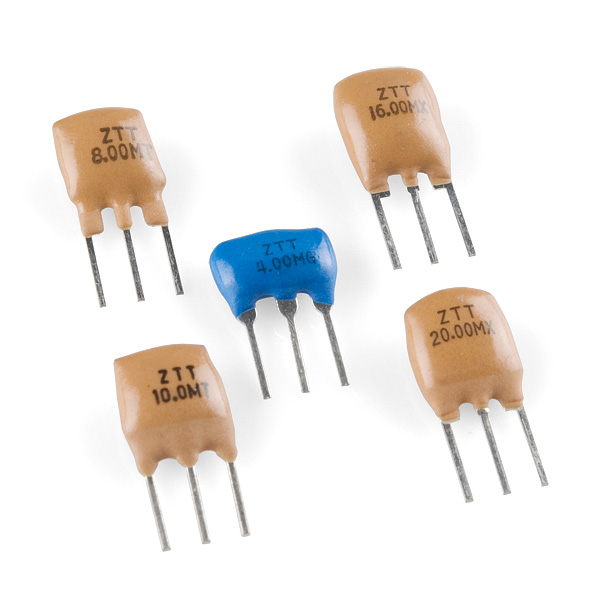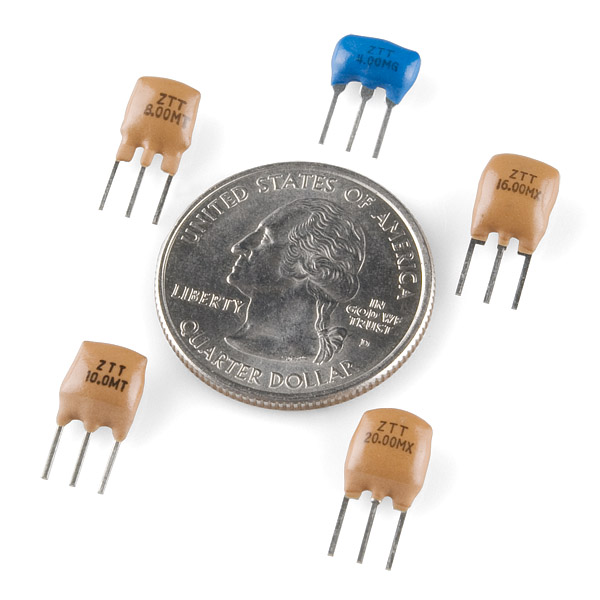×
SparkFun will be closed on Tuesday, December 24th, and Wednesday, December 25th, in observance of the Christmas holiday. Any orders qualifying for same day shipping placed after 2:00 p.m. (MST) on Monday, December 23rd, will be processed on Thursday, December 26th, when we return to regular business hours. Wishing you a safe and happy holiday from all of us at SparkFun!
Please note - we will not be available for Local Pick up orders from December 24th-December 27th. If you place an order for Local Pick-Up we will have those ready on Monday, December 30th.
Ceramic Resonator Kit
Not sure what resonator frequency you might need? Looking to stock up your parts bin? Get this kit of all our resonators!
Resonators function like crystals but are cheaper and have built-in capacitors. Resonators are not quite as accurate as crystals but do function better than crystals over a large temperature range. These resonators are +/-0.5% or better from -20C-+80C. These resonators have built-in load capacitors so no external caps are needed. This kit includes 5 of our most used resonators.
- 1x - 4MHz Ceramic Resonator
- 1x - 8MHz Ceramic Resonator
- 1x - 10MHz Ceramic Resonator
- 1x - 16MHz Ceramic Resonator
- 1x - 20MHz Ceramic Resonator
Ceramic Resonator Kit Product Help and Resources
Core Skill: Electrical Prototyping
If it requires power, you need to know how much, what all the pins do, and how to hook it up. You may need to reference datasheets, schematics, and know the ins and outs of electronics.
Skill Level: Competent - You will be required to reference a datasheet or schematic to know how to use a component. Your knowledge of a datasheet will only require basic features like power requirements, pinouts, or communications type. Also, you may need a power supply that?s greater than 12V or more than 1A worth of current.
See all skill levels
Comments
Looking for answers to technical questions?
We welcome your comments and suggestions below. However, if you are looking for solutions to technical questions please see our Technical Assistance page.
Customer Reviews
No reviews yet.



I find resonators a lot less useful these days since microprocessors now have internal oscillators that are just about as accurate as a resonator.<br />
<br />
And this resonator kit isn't particularly cheap; a much better deal and more useful kit is the crystal assortment (COM-09994).<br />
<br />
For actual timekeeping, even crystals aren't really good enough; you need to use something like a temperature compensated crystal (COM-10079) or the AC power line frequency.
From all that I've experienced, AC mains aren't really.. very exact. I've measured voltages on the AC line on different days and I've gotten from between 115-119 volts AC (60 Hertz). Not sure how stable the frequency is, but if the voltage varies a bit, then why wouldn't the frequency? I wouldn't trust using the AC line to anything timing critical.
Using AC mains as timing source has nothing to do with the voltage, which will definitely vary quite a bit according to load.
The time reference comes from the FREQUENCY of said alternating voltage; 60 Hz (or 50, if you're from some weird country :P). This can vary a little bit over short term but is impressively accurate over 24-hr periods as the power generation company adjusts the generator output to compensate.
My recollection is that the instantaneous frequency of the AC mains (in the US) can vary as much as 5% or so, but over a 24-hour period the average frequency is incredibly accurate.
Yes, crystals are always more accurate than resonators. This is the reason that for some communications, for example, crystals are mandatory, and resonators will not work.
Hmm. Everything I've read says that crystals are more accurate, and resonators are cheaper.<br />
http://en.wikipedia.org/wiki/Ceramic_resonator<br />
<br />
"Ceramic resonators can be found in many circuit boards as they can be used as the source of the clock signal for digital circuits such as microprocessors where the frequency accuracy is not critical.[3] Quartz has a 0.001% frequency tolerance, while PZT has a 0.5% tolerance."<br />
<br />
But you specifically mention temperature variance - so maybe they are less accurate overall, but vary less with temperature?<br />
<br />
I actually don't know a lot about this, but we don't want to give people the wrong information!
Good question.<br />
<br />
These resonators claim 0.5% accuracy, and 0.3% stability over their temperature range and over ten years of age.<br />
<br />
The SMD crystals offered by SFE claim 20ppm accuracy, 30ppm stability and 50ppm over ten years. If I've done my math right, that translates to 0.002% accuracy, 0.003% thermal stability, and 0.005% 10-year age drift.<br />
<br />
Seems like crystals are about 100x more accurate and stable than resonators. Resonators are probably fine for most uses, but I'd stick to crystals for anything timing critical.<br />
<br />
Cheers,<br />
- Dean